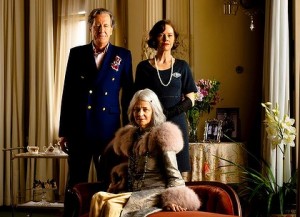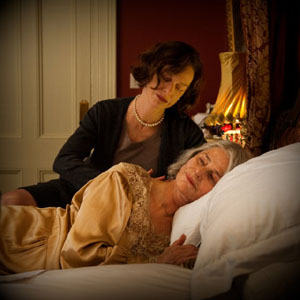Family Crisis Down Under
Written by: FFT Webmaster | September 20th, 2011

Tolstoy got it right in his famous quote from the first chapter of his dysfunctional family melodrama ANNA KARENINA…….happy families are all alike; every unhappy family is unhappy in its own way. In the case of the troika of characters who form the core of THE EYE OF THE STORM, Australian director Fred Schepisi’s artful adaptation of Australian Nobel Prize laureate Patrick White’s 1973 novel, a mother is in her remaining days still finds way to still torment her two children, who have reluctantly come to witness her final decline. The fact that the mother is played with such fierceness and fragility by Charlotte Rampling, and the son and daughter are portrayed by Australian acting royalty Geoffrey Rush and Judy Davis, makes this not only emotionally ferocious but fascinating in a voyeuristic way. However, no matter the origins of pain, all the characters suffer equally from an inability to love and be loved.
Adapted from the celebrated novel by actress Judy Morris and beautifully shot by regular Schepisi collaborator Ian Baker, the film is set in and around a grand old mansion in Sydney’s eastern suburbs during the early 1970s. Wealthy family matriarch Elizabeth Hunter (Charlotte Rampling) is on her deathbed. Her children have returned from many years abroad for a brief visit, both predators concerned only to ensure their inheritance. Basil (Geoffrey Rush) is a pompous actor who has been rewarded for his work in London theatre with a knighthood but who appears to have fallen on hard times. His fate is mirrored by the haughty yet vulnerable Dorothy (Judy Davis), who married into French royalty but is now divorced and agonizingly lonely and unsure of herself.

The characters circle one another like beasts of prey, aware that one can strike out with viciousness at any moment (this is learned behavior) and hide behind an austerity that masks their innate desire for love and connection. In this case, too much time has passed and time is a commodity that the aging mother simply does not have. However, there remains the hope of reconciliation, if only for a fleeting instant. Rampling, not more than 10 years older than her co-stars, is impressively regal (if tattered) as the aging matriarch. It is a role that Rampling almost did not take. “I loved the book and the screenplay”, Rampling offered at an interview during the Toronto International Film Festival last week, “but it definitely required throwing away any sense of vanity. I was definitely hesitant about taking it on, but luckily, there were many flashback scenes where the character’s physical beauty and charisma was evident.” Rampling, an intense screen presence since she broke through in the 1960s with the swinging London-set GEORGY GIRL (1967) and in such memorable melodramas of the 1970s as THE DAMNED (1972) and THE NIGHT PORTER (1978), has blossomed in the latter part of her career, working effortlessly between Hollywood, her native UK and in European productions, often in different languages.
For his part, Geoffrey Rush has become one of Australia’s most dynamic acting presences, both on the proscenium stage and on screen. An Oscar winner for SHINE (1996), Rush brings his innate theatrically to the role of the flamboyant son, who is accustomed to juggling masks and hiding his true feelings. With such successes in the past few years as THE KING’S SPEECH and the PIRATES OF THE CARIBBEAN franchise, the film marks a return to his native Australia and peculiarly Australian themes. “I felt very strongly that I wanted to be part of this film because it is so much a part of the Australia of my youth, a country caught between European civility and outback adventurousness”, Rush shared at the same TIFF interview. “It is also is a chance to expand the audience for Patrick White, a novelist who despite his Nobel laureate award is not very well known to international audiences. This next year is the centenary of his birth, so it seemed a perfect time to bring attention to this remarkable writer.” Judy Davis, has also alternated between Australian films and Hollywood projects, including several with Woody Allen. Davis has honed a unique on-screen tic of barely contained neurosis which threatens to overflow at the smallest provocation. Her high-strung character, who fleetingly enjoys some quiet moments with her mother, is like a wounded bird who has forgotten how to fly. Fred Schepisi solidified his status as part of the Australian New Wave of the 1970s with such distinguished films as THE DEVIL’S PLAYGROUND (1976) and THE CHANT OF JIMMIE BLACKSMITH (1979). He memorably has directed Meryl Streep in two of her most striking performances in PLENTY (1985), an adaptation of the celebrated David Hare play, and A CRY IN THE DARK (1989), where Streep’s performance as an unstable mother earned one of her 10 Oscar nominations. His Hollywood resume includes a delightful modernization of the Cyrano De Bergerac story with Steve Martin in ROXANNE (1987), the cold war thriller THE RUSSIA HOUSE (1990) and the big screen filming of John Guare’s Pulitzer Prize winning play SIX DEGREES OF SEPARATION (1993). He memorably filmed actors Kirk and Michael Douglas in their only on-screen collaboration in the family dysfunctional dramedy IT RUNS IN THE FAMILY (2003). The excess of that family dynamic informs his work in THE EYE OF THE STORM, but there is scant comedy in its telling. The film nudges more in the direction of Shakespearean tragedy, with a decided Australian accent.


